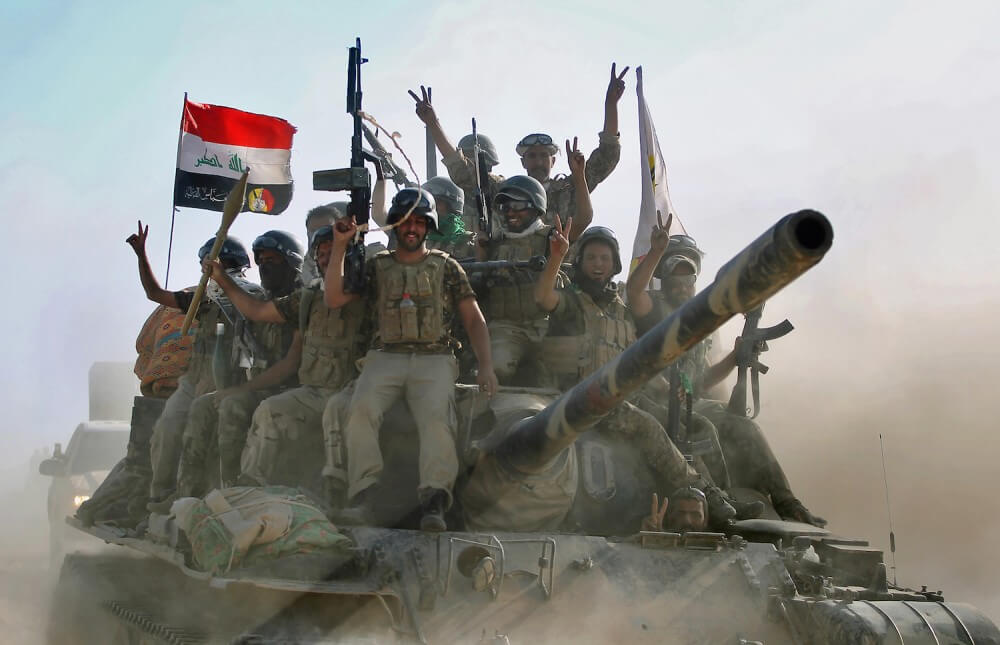Last week, Iraq held its fifth national election since dictator Saddam Hussein was toppled by American forces in 2003. Despite a voter turnout of 43%, the country’s lowest on record, international observers noted that the vote was “well managed” and “competitive.” In fact, the election, with 329 seats at stake, was a hotly contested affair and involved a diversity of participants, including Shia, Sunni, and Kurdish parties as well as independents. The vote saw several parties make major gains, like the 32 seats won by the Kurdish Democratic Party (KDP), which was better than the 25 seats it secured in 2018. However, the biggest losers of the election were the pro-Iranian parties.
In a major setback for Iran and its allies in Iraq, the Fatah Alliance, which consists mostly of individuals belonging to the Iran-backed Popular Mobilisation Forces (PMF) and the Badr Organization, managed to secure only 16 seats. Considering that it won 48 seats and came second in 2018, the results are a huge loss for its ability to influence Iraqi politics.
Moreover, to add to Iran’s fears, the election was won by the Sadrist bloc of parties led by Shia cleric Muqtada al-Sadr, whose forces fought American troops following the United States’ invasion. A fierce opponent of foreign interference, Sadr has called for reducing Iranian influence in Iraq. In an address announcing his victory, Sadr said “from now on, arms must be restricted in the hands of the state” and that weapons usage “shall be prevented outside of the state’s framework,” even for groups claiming to be the “resistance” against US forces, a reference to pro-Iran militias operating in Iraq.
As expected, Pro-Iranian parties rejected the results and called it a “manipulation” and a “scam.” Hadi al-Amiri, leader of the Fatah Alliance, said the Alliance would “not accept these fabricated results, whatever the cost.” Amiri’s concerns were echoed by the militant group Kataib Hezbollah, a prominent Iranian proxy in Iraq that is responsible for carrying out attacks against American soldiers. The group accused Iraqi Prime Minister Mustafa al-Kadhimi of “committing fraud” and “cooperating” with Iraq’s enemies. “The farce of the elections organized under a legal name was the biggest theft and ploy committed against the Iraqi people,” the Kataib Hezbollah leader claimed.
The refusal to acknowledge the result of the Iraqi election reflects the concerns that Iran and its Iraqi allies might have about their declining influence and indeed their waning popularity among the Iraqi populace. A June 2020 Gallup poll showed that Iran’s favourability rating of 15% was at its lowest point in years. Even the US received greater support among Iraqis than Iran. Moreover, the poll results came at a time when the US was facing severe backlash in Iraq for the drone strike that killed Iranian Quds Force chief Qassem Soleimani and Abu Mahdi al-Muhandis, the deputy head of the Iran-backed Iraqi Popular Mobilization Forces (PMF), on Iraqi soil, demonstrating just how unpopular Iran has become.
Despite this downturn in popularity and the election setback, however, Iran is likely still confident about maintaining its clout in Iraq. This confidence is drawn from the fact that several pro-Iranian Shia militia groups have been able to gather power at the expense of the Iraqi military. Most of these militias, including the Badr Organization and Kataib Hezbollah, fall under the umbrella of the PMF, which receives Iran’s security and economic backing.
Since the PMF was founded in 2014, it has been one of the main pillars of Iran’s strategy to eliminate the presence of the Islamic State from Iraq. The group is not an official part of Iraq’s security apparatus but was recognised as a state-affiliated organisation in 2016 by the parliament as a result of its effectiveness in fighting ISIS. However, the PMF’s recognition further entrenched its power in the country, and on several occasions, it has acted independently of the Iraqi government.
The PMF controls the movement of people and goods, enforces a parallel taxation system, and has also involved itself in local religious matters, including the control of Sunni religious sites and endowments. Additionally, the PMF maintains a strong military presence in the country. Some of the groups affiliated with the PMF have been responsible for conducting attacks without the backing of Iraq’s military. For instance, Kataib Hezbollah has launched several drone attacks on US bases in Iraq and kept the Iraqi military in the dark about its activities.
This consolidation of power by the PMF has concerned Iraqi military officials, who have claimed that Iran-backed groups are starting to dominate the country’s security establishment. They are also worried that these groups are increasingly disregarding the authority of Iraq’s military and are even resisting attempts to be integrated into the military and police.
In 2019, The Intercept revealed hundreds of leaked documents that showed the extent of Iran’s influence in Iraq. The documents show how Iran has painstakingly worked for years to “infiltrate every aspect of Iraq’s political, economic and religious life.” Furthermore, a 2020 investigative report by Reuters shows that Iran has spent millions in infrastructure projects and building religious institutions throughout Iraq, in an effort to build its soft power and shore up support.
Therefore, while the election proved to be a major roadblock for Iran’s efforts to bring Iraq under its axis of influence, Tehran’s control over its neighbour’s security and its vast influence in Iraq’s social, economic, and cultural spheres still remains intact. As long as Iran is able to maintain this level of influence, its grip over Iraq will not diminish any time soon.
Iran Will Maintain its Clout in Iraq Despite its Allies’ Setback in the Election
As long as Iran is able to maintain control over Iraq's security, economic, and social spheres, its grip over the country will not diminish any time soon.
October 20, 2021

Members of the Iran-backed Popular Mobilization Forces advance toward the town of Tal Afar, Iraq, on Aug. 22, 2017. SOURCE: GETTY IMAGES
